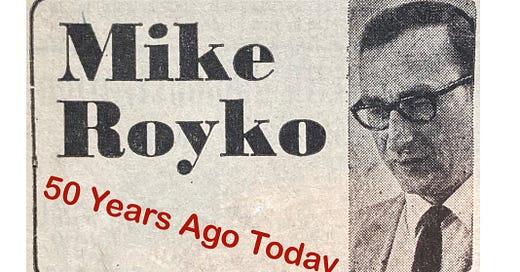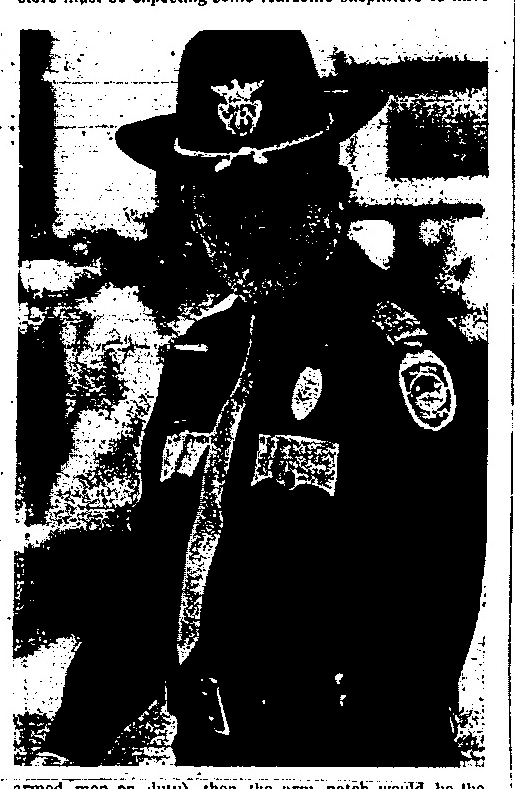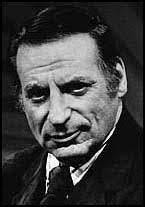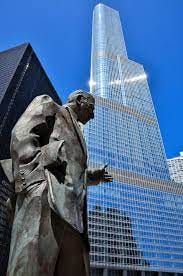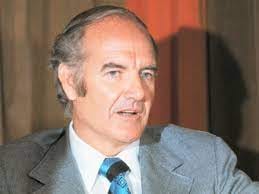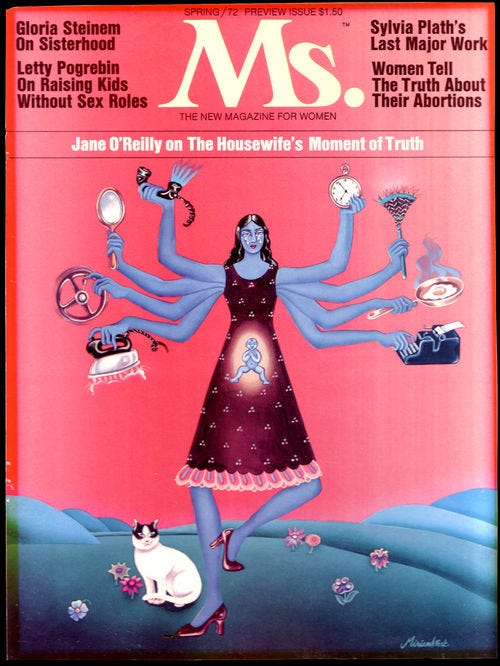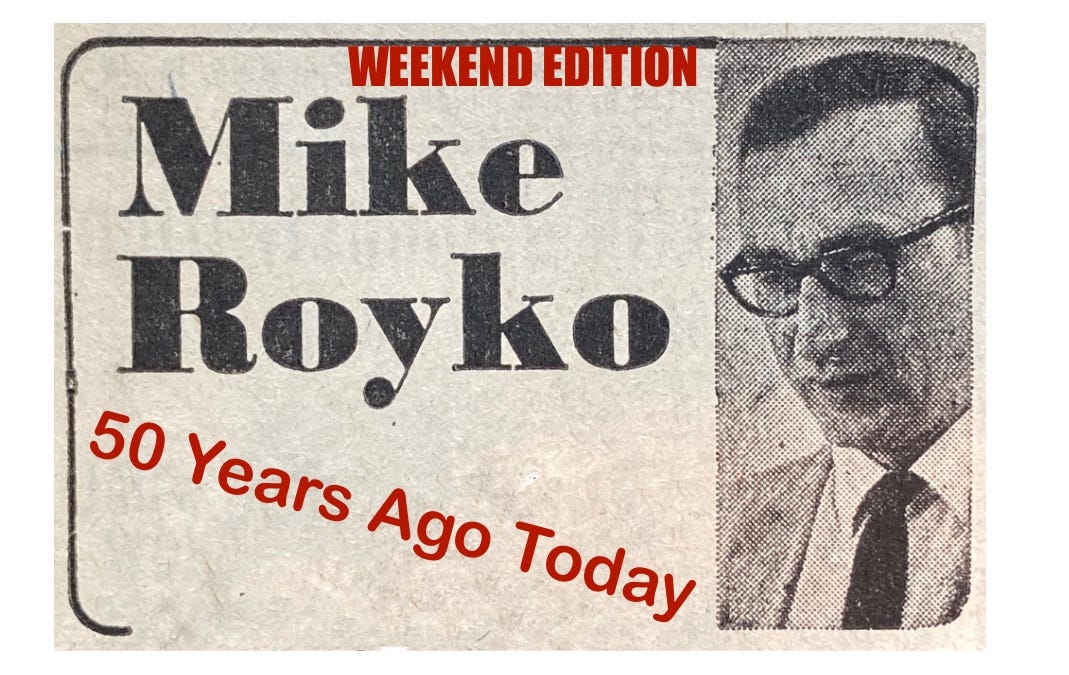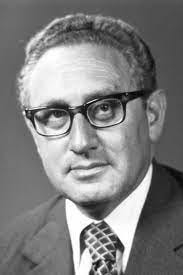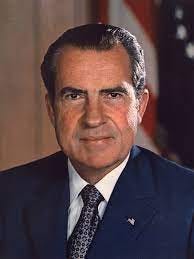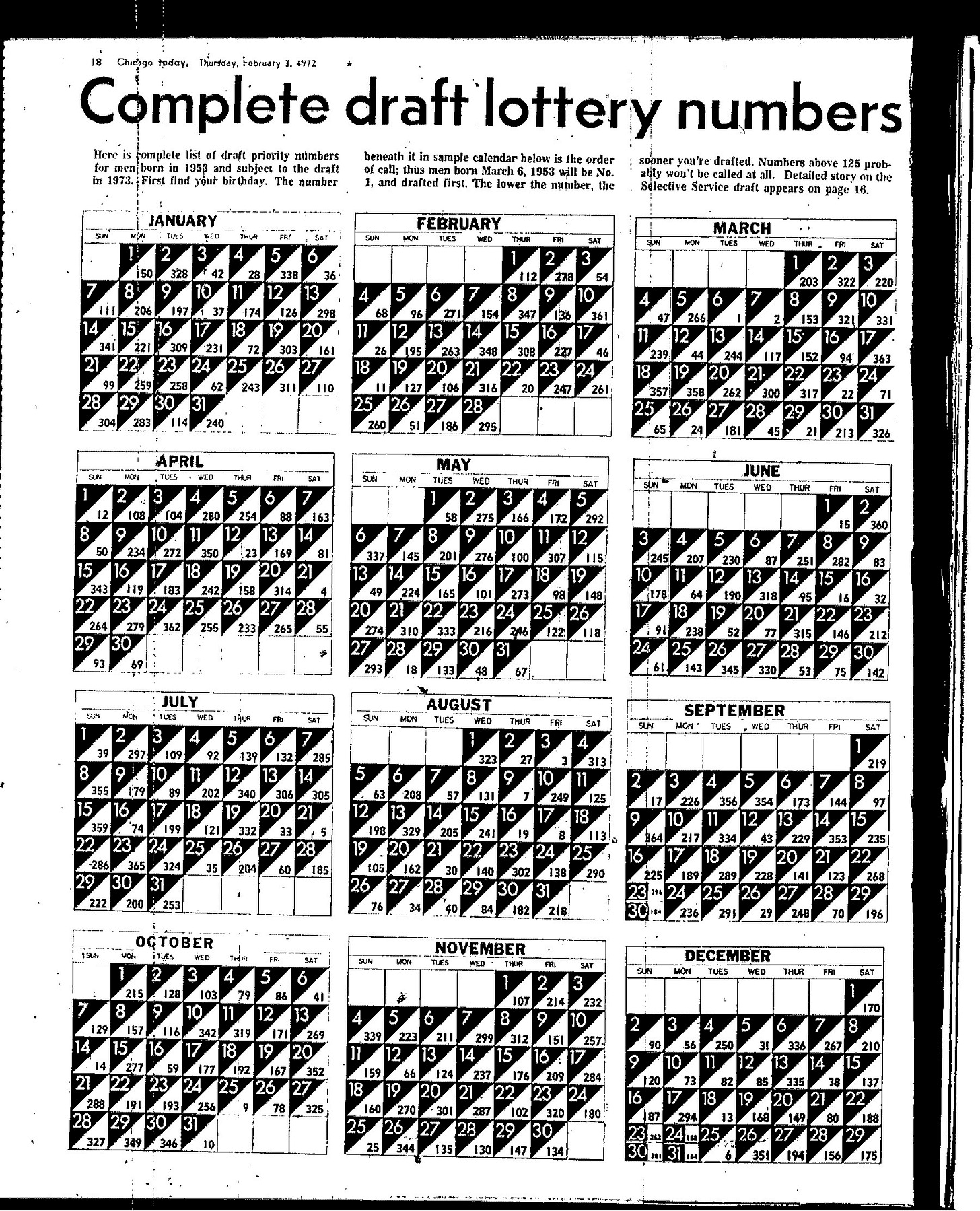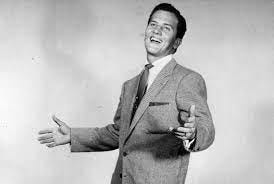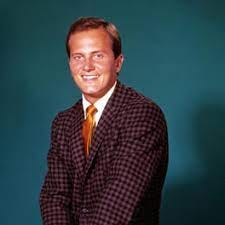Mike Royko 50 Years Ago Today: George McGovern calls somebody a "horse's ass"
Weekly compilation February 7-13, 1972
To access other parts of this site, click here for the Home Page.
Why do we run this separate item, Mike Royko 50 Years Ago Today? Because Steve Bertolucci, the hero of the serialized novel central to this Substack, “Roseland, Chicago: 1972,” lived in a Daily News household. The Bertolucci’s subscribed to the Daily News, and back then everybody read the paper, even kids. And if you read the Daily News, you read Mike Royko. Read the daily Royko briefing Monday-Friday on Twitter, @RoselandChi1972.
February 7, 1972
Rent-a-cop attire tricky
A rare Royko column that includes a photo.
Mike shows us a photograph of a tough-looking guy in a very official uniform. Sorry the quality here isn’t that great--microfilm leaves much to be desired. But his stance says plenty. Give him some aviator sunglasses and he’s straight out of “Cool Hand Luke.”
Mike notes that this man has a badge, and his arm patch says “Illinois.” He also has a gun and some MACE.
Mike asks us to guess: Is this guy an Illinois state trooper, an Illinois Secretary of State special policeman, a Cook County sheriff’s deputy, a suburban cop, or a state’s attorney policeman?
“Have you decided? Good. But if you picked any of the above, you are wrong….The man works in a department store on State Street. His job is to keep an eye out for shoplifters.”
Mike doesn’t tell us precisely which store this rent-a-cop patrols. I notice Mike does this rather often. He gives a vague identification rather than saying, “He works at Field’s,” or “He works at Carson’s.” Anyway, on we go.
Mike notes that more and more of these rent-a-cop companies are using these realistic uniforms, and that the rent-a-cops don’t even need any training. Security companies gets one private detective license to cover all the employees.
“[T]here are two schools of thought on uniforms of rent-a-cops,” Mike writes. “One holds that in a modern city, half of the citizens are at any moment plotting mayhem against the other half, so we need all the uniformed and armed men we can get.
“But the other position is that arming men who have had little or no training is dangerous enough. And by putting them in realistic uniforms, some might start believing they actually have police powers.
“When this happens, as it has in the past, you start hearing about somebody being shot by a guard in a grocery store for snatching a can of beans.”
It’s ironic that these days, Mayor Lightfoot recently blamed Michigan Avenue stores for shoplifting mobs, claiming they weren’t using enough security guards.
February 8, 1972
Acute crisis in identity
The ‘70s are a time for many people to have an “identity crisis” and go “find themselves.” That phrase itself, “find yourself,” surely did not exist prior to, say, the late ‘60s. My guess is the country needed a larger established middle-class before enough people had time to look for themselves. And more time between World Wars.
“This occurs most often among young people,” writes Mike. “When it happens they sing a sad song about it, or renounce their parents’ central air conditioning, smoke strange things, put flowers in their hair, eat organically grown peanuts, or assume the lotus position.”
“As for myself, I never had an identity crisis. I have always known who I am, which, while deeply depressing, saved me a lot of running around looking for me. But now it has happened to me. I have had my identity crisis. It came about in a strange way.”
Here’s how it happened: Mike hoped to get picked from among the many reporters vying to go to China with President Nixon. For that, he needed a passport. For a passport, he needed a birth certificate. He didn’t remember ever seeing one.
Remember, this is a time when you didn’t need any identification to get on a commercial plane flight until literally yesterday—February 7, 1972. Even today, February 8, you’d only be asked for an ID if you fit the FAA’s “behavioral profile” of a skyjacker. (See this week’s THIS CRAZY DAY IN 1972 for more on the FAA’s new anti-skyjacking rules.)
Mike goes to City Hall and gets his birth certificate at the clerk’s office.
“As I read it, my identity crisis exploded…it said my name was Mitchell.”
“How could my name have been Mitchell all of these years without my knowing it? And if it was Mitchell, why have I always thought it was Michael?...Then, who was I? Maybe Kup? I began feeling like a teen-ager.”
An older relative clears up the mystery. He tells Mike that the doctor who delivered him was called to the hospital from a wedding on Milwaukee Ave, shorthand for a big boisterous hard-drinking Polish affair. Afterward, the doctor and Mike’s dad went for a drink on North Avenue. “And after they had a few, the doctor wasn’t thinking too clearly, and he didn’t know much English anyway, so he probably wrote in the wrong first name.”
FYR: Legendary gossip columnist Irv “Kup” Kupcinet appeared in the Sun-Times for 60 years. Kup’s was definitely a gossip column, but the term understates Kup’s status. I talked recently with Mike Miner, long time media critic for the Reader and former Sun-Times reporter, to ask him about the Daily News’ “Jon and Abra” gossip column. Mike (Miner that is) had written once that their gossip column “trivialized” both Andersons. As he put it in our conversation, “The only [gossip column] that ever really was taken seriously in Chicago was Kup’s.”
That said, I have no idea if Mike Royko is making fun of Kup with this reference, or what. I’ll ask around and update with the answer if possible.
Kup has a statue along the river at Wacker and Wabash, across from Trump Tower, which used to be the site of the Sun-Times Building. He is the only gossip columnist in town with a statue.
In fact he’s the only columnist, period, with a statue in town. That means Mike Royko does not have a statue, I realized as I proof read this. The campaign to get a Mike Royko statue has begun, check here for details!
February 9, 1972
The unbridled Sen. McGovern
This would get Mike in trouble today--but he’s not actually wrong. And he’s kidding, to give himself an angle to write about McGovern exchanging salty words with a woman during the '72 presidential campaign.
Mike’s opener: “A Chicago woman says that Sen. George McGovern, the most mild-mannered of the presidential aspirants, recently called her a ‘horses’s ass’ in public.”
Prof. Roberta Christie of Loyola's education department says she was on a Springfield-Chicago flight when passengers learned the take-off would be delayed for McGovern. They waited 17 minutes according to the airline, 40 minutes according to Prof. Christie.
McGovern shook everybody’s hand and apologized when the flight got going.
“When he came to me I stated tactfully that I thought he could have been more considerate and taken a later plane. Also, I refused to shake his hand, stating that as a matter of principle I do not shake the hands of politicians,” Prof. Christie told Mike.
“His LOUD retort was: ‘You are a horse’s ass.’ Such vulgar language--especially addressed to a lady--seemed shocking to me.”
McGovern’s press people deny he said any such thing, though one press aide insisted Prof. Christie was “obnoxious” and “whatever he said, she deserved it.”
Mike reasons: “McGovern is always polite, civil, low-key, and reasonable. This approach has earned him almost last place in all the polls. Has he finally wised up?”
With enough phone calls, Mike finally reaches McGovern.
“’Maybe I said something that I shouldn’t have,’ he said. ‘But at least this will lay to rest the line that I am too nice to run for President.’”
Mike says he sides with McGovern: “That is because I believe in the women’s liberation movement….Why should it be more shocking to a female? Does a horse--either end of a horse--look different to a woman’s eye? If McGovern actually said it, then it proves that the new women’s lib magazine, Ms., was correct in its recent rating of male presidential candidates, as to their treatment and views of women. They gave McGovern their highest score.”
February 10, 1972
Some better ideas for Ford
The Ford Motor Company is so sorry by now that it ran an ad campaign asking customers for ideas so they could “do a better job”--if only because it heard from Mike Royko.
“I am always eager to help, so I wrote a column saying that my car had started falling apart right after I bought it. I suggested they could do a better job if they didn’t sell cars that quickly fell apart. A Ford public relations man called me and sounded upset about my column. This proved once again that you should never try to help people.”
Now Mike’s car has a problem with a wheel, since he ran over a big pothole while turning right from Ohio onto LaSalle. “The hole has been there a long time, but I’m sure it will be fixed as soon as the Department of Streets and Sanitation is done signing Judge Berg’s petitions.”
Reminder, Mike broke the ongoing forgery story/scandal with Judge Berg’s voter petitions to get on the primary ballot for Cook County State’s Attorney. Mayor Daley dumped indicted incumbent Ed Hanrahan as the Democratic candidate for state's attorney and gave it to Berg. But Mayor Daley waited until the morning of the day the petitions were due at the City Clerk's office. City Hall flunkies spent the day running around City Hall itself, brazenly forging signatures on the petitions. They "got" about 20,000 signatures in six hours.
Anyway, the Ford dealer charged Mike $60.35 without fixing the tire. But they put in new points and changed the oil, without touching the tire. He went back. For another $135, they offered to fix the wheel.
Mike’s conclusion: “Just as soon as your men repair that wheel (maybe a muffler will do the trick), I will pass this vehicle on to another owner.”
February 11, 1972
Chicago cabs can’t hack it
If you think it’s tough catching a ride now, you never tried getting a cab in 1972.
Mike tells the story of a semi-invalid woman whose husband was rushed to the hospital from work. She couldn’t get a cab from her Northwest side home to get there. She called of course, but no cabs came. Finally a neighbor came home from work and gave her a ride.
She wondered why it’s so hard to get a cab, and Mike tells us.
“Forty-five years ago, the city had 20 per cent more cabs than it has today, and it was a competitive business, with many independents.
“But with the help of City Hall, Yellow and Checker cabs--the same outfit--ended up with 80 per cent of the licenses. And now they have the business virtually locked up, and it is impossible to compete.
“The cab kings and the politicians tell us it is for our good, that by limiting the number of cab licenses in Chicago to 4,600, we benefit.
“But a study made last year by three University of Chicago Law School professors concluded that it is done primarily for the good of Yellow Cab Co.’s profit.
“Just what good comes to City Hall I leave to the cynical imagination of Chicagoans.”
February 12-13, 1972
As we here all know, weekends could be sad for a Daily News family because Mike Royko wasn’t in the Daily News’ single weekend edition. So we look for Mike elsewhere on weekends.
Let’s dive again into Mike’s first column collection from 1967, “Up Against It.” The columns are undated in the book, but all appear some time between 1963-67. From the contents of the column, this one must have appeared no earlier than 1966.
Patriotic Pat Swings Again
“Pat Boone, that symbol of goodness, has launched a two-fisted musical attack on young men who are not eager to fight in Vietnam.”
Let’s note a few things immediately for everyone, but especially For Younger Readers:
First: Mike served during the Korean War. Richard Ciccione’s biography, “A Life In Print,” quotes Mike telling an interviewer that he picked the Air Force, hoping he would end up in Bermuda. Mike enlisted in the Air Force rather than waiting to get drafted, but he did not end up on a beach. The Air Force sent Mike for radio technician training, and then to South Korea. From Ciccione:
“I was issued a carbine, and I said, ‘What the hell is this for? I’m a technician.’ Royko’s combat experience was limited. “One night they hit a point in the fence close to where I was. We shot at them. They shot at us. One of them was killed and a half dozen wounded.” Royko never claimed he shot anyone.
But according to Doug Moe’s “The World of Mike Royko,” “The truth is Royko was often in harm’s way in Korea.” Mike was in Korea for only about six months due to the signing of the Korean Armistice. He was sent next to a base north of Seattle. His roommate there, Don Karaiskos, told Moe that Mike talked little about his Korean experiences.
Moe quotes Karaiskos: “He never talked about the war in philosophical terms. But he was a forward air controller….It was a rather hazardous thing. They would go out in front in a jeep and call in on the radio strikes from the air.”
So, Mike is a veteran who volunteered for service, rather than being drafted, and he did see combat. I mention this because it’s interesting to note to yourself, now, what preconceptions you may have about how a veteran in 1966 will react to someone like Pat Boone who criticizes people who wouldn’t serve in Vietnam. What do you think Mike will say about Pat Boone and his message? Now hold that thought.
Second: The Vietnam War was already raging in 1966, of course. There were almost 400,000 U.S. soldiers in Vietnam by the end of 1966. That year, over 6,000 U.S. soldiers would die, and over 30,000 would be wounded. In our 1972 timeline, FYI, it’s an especially hot topic right now because the country recently found out about National Security Advisor Henry Kissinger’s secret negotiations with the North Vietnamese in Paris, which didn’t seem to accomplish anything.
President Nixon keeps promising we’re about to exit Vietnam. There are ongoing troop withdrawals, but there’s no actual date for the war to end.
There were 156,800 U.S. soldiers in Vietnam as 1972 begins. As 1972 ends, a New York Times headline will read: “More than 50,000 Americans killed in Vietnam, more than 300,000 wounded or injured, more than 1,600 P.O.W.’s or M.I.A’s”.
Third: A draft lottery was held last week, which looked like a Bingo game that could get you killed. Two members of the “Selective Service Youth Advisory Committee” picked capsules with numbers out of a rotating drum to randomly match each day of the year with the numbers 1-365. Each day is a birthday, and the men turning 19 this year with birthdays assigned the lowest numbers will get drafted first. This was the fourth lottery since 1969. Chicago Today printed all the numbers on a full page:
People don’t like to go die in pointless wars in general, but more, they don’t like to die in pointless wars that are just about to end anyway. As John Kerry said in testimony before the Senate Committee on Foreign Relations on April 23, 1971, “[H]ow do you ask a man to be the last man to die in Vietnam? How do you ask a man to be the last man to die for a mistake?” Kerry said that almost a year ago, in our timeline here. Though as noted, Mike wrote this column circa 1966.
Fourth: Pat Boone. Where to start. Those of you who have read Chapter 3 will remember my friend and guide in the library microfilm room, Gil. Gil tells me Pat Boone was a very successful singer, but with notoriously awful, bland pop music. I checked and told Gil that Pat Boone was the second-biggest charting singer of the 1950s, behind only Elvis Presley. Gil refused to believe it. “I know it was the ‘50s, but I still thought better of the country,” he said.
Pat Boone had a weekly variety TV show 1957-60, which was still the early years of television—which means he had relatively little competition, so having a TV show was a much bigger deal.
“Here’s the thing about Pat Boone,” Gil told me, after he got over Pat Boone’s record sales. “It was like he was a human sanitizer dispenser. He just spread some kind of sterilizing goo over everything he touched.”
Pat Boone morphed from pop singer to conservative fundamentalist Christian religious activist. In 1964, he was a main speaker at a rally called “Project Prayer” that hoped to get Congress to bring back mandatory prayer in public schools after the U. S. Supreme Court declared it unconstitutional. Not surprisingly, Pat Boone thought communists were behind the disappearance of school prayer.
Now back to “Patriotic Pat Swings Again” in progress:
“Patriotic Pat has done it with a song called ‘Wish You Were Here, Buddy,’” writes Mike. “He wrote the song and he sings it. It is frankly contemptuous of draft-card burners, protestors of the war, and Cassius Clay, the world champion punching bag for the super patriots.” *
Mike says Boone’s song is being pushed by certain disc jockeys across the country. He sings the song on TV and in personal appearances, and claims he got a standing ovation for it in Las Vegas.
The song is supposed to be sung by a U.S. soldier in Vietnam to his friend who’s not serving. Mike prints most of the lyrics, including:
“Heard you let your hair grow, til it’s hanging on your shoulders, and you hardly have time to shave
Bet the girls all flip, cuz you look so fine, like something’ crawled out of a cave
Heard Uncle Sam nearly scared you to death, but you fooled him just in time
Just stuck a little match to your ol’ draft card and you burned up a future like mine
Oh I know you’re not scared, you’re a real brave guy, you’re a regular Cassius Clay
And I know you'da fought when the country was young, but. the world’s just different today
Well, you just stay home, and leave the fightin’ to us and when the whole durned mess is through
I’ll put away my rifle and the ol’ uniform and I’ll come a’lookin’ for you.
Mike ponders the song after hearing it on the radio. He’s curious about Pat Boone’s military history, so he checks.
“I reasoned that anyone who could write that kind of rough-and-tumble foxhole music—especially the dark threat about comin’ back and lookin’ for you—must know what it was like over there.”
But it turns out Pat Boone never served. His excuse is that he was 19 when the Korean War ended, and he got married and went to college that year. Later, he wasn’t drafted because he was married with kids. Boone told an interviewer once that he was “a partial conscientious objector” who would have been happy to be a front-line medic, if only he wasn’t already a father.
“It’s true that many men of nineteen, or even younger, were fighting and dying in Korea in 1953,” Mike notes. “But they were volunteers. They had enlisted.” Which Pat Boone chose not to do. Mike leaves that unsaid, and yet stuck in our minds.
Mike also doesn’t mention, though we here know, that he himself volunteered and was serving under fire in Korea the year Pat Boone could have joined the service, if he really wanted to.
Mike continues:
“Boone’s willingness to be a front-line medic, had he been taken, is laudable, although it would be an impractical situation for the Army if everyone felt that way, as it is difficult to win a battle by swatting the enemy with stretchers.”
Mike imagines Boone’s Las Vegas audience might be stirred by this song to leap from their seats in a casino and run out to enlist instead of playing dice.
“Or at least they might stagger outside and throw a silver dollar at someone wearing a beard.”
*FYR: “Cassius Clay” is the birth name of heavyweight boxing champion Muhammed Ali. Mike often mentions the hypocrisy of people who gave Ali a hard time for declaring himself a conscientious objector and announcing he would not fight if drafted in the Vietnam War. As I mentioned, this column was written no earlier than 1966, the year Ali announced he would not serve, and also the year Pat Boone released this song. According to Encyclopedia Brittanica, Ali changed his name in 1964, so I was surprised Mike referred to him here as “Cassius Clay.” Taking a look at the Tribune’s digitized archives, however, I see it was still standard newspaper style to ID Ali as “Cassius Clay” in 1966.
By the way, this feature is no substitute for reading Mike’s full columns. He’s best appreciated in the clear, concise, unbroken original version. Mike already trimmed the verbal fat, so he doesn’t need to be summarized Reader’s Digest-style, either. Our purpose here is to give you some good quotes from the original columns, but especially to give the historic and pop culture context that Mike’s original readers brought to his work. You can’t get the inside jokes if you don’t know the references. Plus, many columns didn’t make it into the collections, so unless you dive into microfilm, there are some columns covered here you will never read elsewhere. If you don’t own any of Mike’s books, maybe start with “One More Time,” a selection covering Mike’s entire career and including a foreword by Studs Terkel and commentaries by Lois Wille.
Do you dig spending some time in 1972? If you came to MIKE ROYKO 50 YEARS AGO TODAY from social media, you may not know it’s part of the book being serialized here, one chapter per month: “Roseland, Chicago: 1972.” It’s the story of Steve Bertolucci, 10-year-old Roselander in 1972, and what becomes of him. Check it out here.
To get the weekly compilation of MIKE ROYKO 50 YEARS AGO TODAY in your mailbox along with THIS CRAZY DAY IN 1972 and new chapters of the book, SUBSCRIBE FOR FREE!

